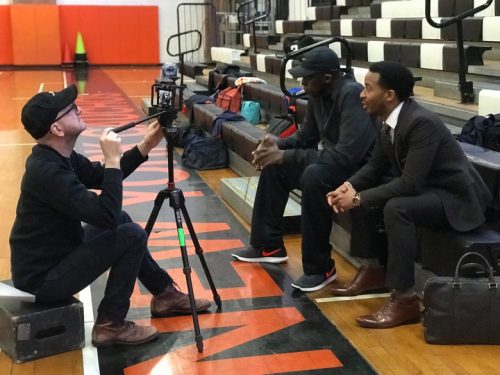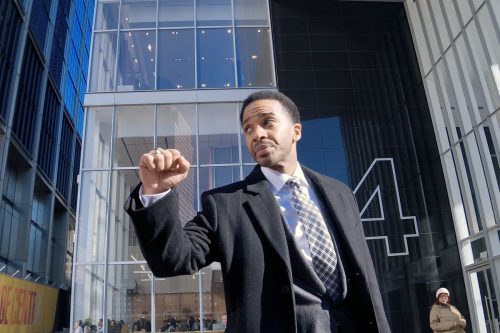★★★★☆
(Alessandra Luciano) Steven Soderbergh, who in 2009, claimed that he was done with cinema has recently released his latest movie. However, High Flying Bird is Soderbergh’s second movie shot with an iPhone and a Moondog Labs Anamorphic Adapter, the same lens Sean Baker used for his 2015 movie Tangerine. What’s more, High Flying Bird is only on Netflix, which also produced it, as such it would be safe to argue that at least from a production and distribution standpoint this indeed is not cinema.

Steven Soderbergh filming High Flying Bird (c) Netflix
It is a shame that High Flying Bird is not on the big screen as the cast truly deserves it. But at least from home you could pause the movie (I usually would not recommend this) to research a real problem prevalent in US society regarding the abuse of power of agencies, networks and universities over young talented athletes that Soderbergh addresses here and that perhaps NFL player Colin Kaepernick has been the most recent embodiment of.
Thus, High Flying Bird makes a movie about basketball and a lockout between the NBA and the athletes, a dispute over their salaries and rights to their image, more than just the story of an anti-hero, Roy Burke (André Holland), a sports agent, who tries to not only play the game but also to disrupt “the game on top of the game” whilst teaching his newest recruit Erick Scott (Melvin Gregg) how to stand up for himself and not to get cheated by the system.

(c) Netflix
The movie never misses a beat regardless if talking about slavery or its modern day manifestation, the business of major league sports (mostly controlled by white men), or the meaning of community especially in low-income areas. As such, it is definitely worth the watch as its fast paced dialogues and production aesthetic make for an informative, entertaining, and relevant movie. The subject matter makes it indeed clear that this is not only Soderbergh’s work (despite him signing the cinematography and editing by his aliases), as the screenplay was written by Tarell Alvin McCraney whose story Moonlight was adapted into a film by Barry Jenkins in 2016.
The only reproche to be made is as the movie is hailing the disruptive powers of new viewing habits, facing off with big television networks, so too does Netflix not miss the chance to position itself as a force of major change. It appears then that any Netflix series or film has to keep referencing the platform, as an embarrassing attempt to remind the viewer that despite their 12,4 bn investment into their own productions (in 2018), the platform is still a novice game changer. This somewhat annoying Netflix habit, is not meta but narcissistic. However, we all now what happened to Narcissus.
Als partizipative Debattenzeitschrift und Diskussionsplattform, treten wir für den freien Zugang zu unseren Veröffentlichungen ein, sind jedoch als Verein ohne Gewinnzweck (ASBL) auf Unterstützung angewiesen.
Sie können uns auf direktem Wege eine kleine Spende über folgenden Code zukommen lassen, für größere Unterstützung, schauen Sie doch gerne in der passenden Rubrik vorbei. Wir freuen uns über Ihre Spende!
